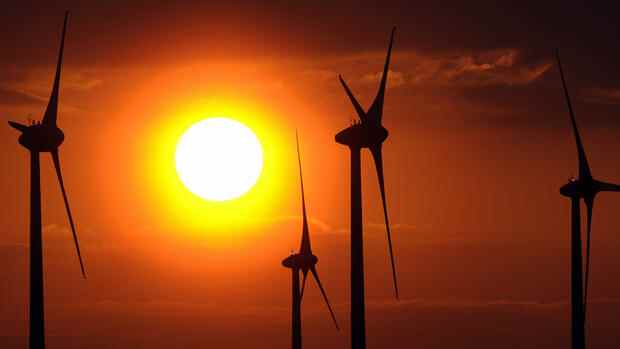Wind power could yield less profit in the future.
(Photo: dpa)
Brussels The officials of the EU Commission have put together initial ideas on how to react to the high electricity prices with market intervention. In an informal draft (non-paper) available to the Handelsblatt, they describe the effect of a price limit on electricity that was not generated with gas.
The operators of wind, solar, coal and nuclear power plants would have to pay the money earned beyond this price limit to the state. This principle would not be an excess profit tax, but would have a similar effect. It would also be compatible with the announcements of the federal government.
According to EU Commission officials, it would be possible to apply this model in all member states at the same time, or just in individual ones. The states could use the additional revenue to support particularly affected consumers or to pay industrial companies to reduce electricity consumption.
The state would therefore relieve the burden on citizens without lowering the electricity price. The proposal has not yet been agreed within the Commission. An official proposal is expected by mid-month.
Top jobs of the day
Find the best jobs now and
be notified by email.
Such an intervention in the market would lead to relatively few shifts in pricing compared to other models discussed, such as a hard price cap.
There may well be loopholes in the EU plan
However, market behavior would change. Producers could increasingly sell the cheap electricity from wind and solar power plants directly to bulk buyers and thus bypass the price limits on the electricity exchange. As a result, the price would rise again there, which weakens the effect of the measure.
>> Read here: After the gas shortage, there is a threat of electricity shortages – How the drought endangers Europe’s supply
There is no information in the paper on a possible height of the price limit. But this can be decisive, otherwise producers could hold back amounts of electricity and invest less in the power plants. That would drive the price up again. It is possible that the expansion of renewable energies should be promoted more by the state.
The price limits could be flanked by further measures to reduce demand. There are already EU-wide requirements for gas, but not yet for electricity.
The officials expressly reject the Spanish model of a gas price cap. There, the purchase of gas is subsidized if it is used to generate electricity. This reduces the electricity price for end customers.
This would increase demand and the power plants in the EU would produce 25 terawatt hours more electricity than without this measure. The gas-fired power plants would then generate 45 billion cubic meters more gas.
One reason for this is that the subsidized electricity then flows abroad – in the event of an EU-wide introduction of the price cap, this would include Great Britain and Switzerland. Other measures that directly affect the price would have the same effects. They are therefore all rejected in the non-paper.
More: “The market situation is complete madness” – This is behind the record prices for electricity
